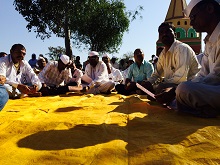Krishi Star, stabilising incomes for small farmers
Krishi Star aims to increase and stabilise incomes for small farmers in India by giving them greater ownership of the food value chain through farmer-owned processing units. Co-founder, Bryan Lee, talks about their plans to help bring 200 million farmers about of poverty.
What is the core value proposition of your business?
The end goal of what we’re trying to do is to lift farmers out of poverty. We believe in doing it in three ways. The first is giving small farmers greater ownership of the value chain. Right now farmers just produce a crop and sell it; they have no control of the prices, don’t get value for their crops and basically have no market power. We want them to own more of that economic value for what they create. So we help them take their crops and create more valuable products that they have greater ownership of. We ensure this greater ownership by setting up farmer-owned food processing units. We currently have one unit in Gujarat that is working with tomato farmers.
The second objective is to improve market access to these farmers. We’re currently seeking out niche markets because it matches the scale at which we are operating and gives us the ability to enter the market competitively. So at the moment we’re producing canned tomatoes and puree and selling it to restaurants in Mumbai.
We also know we can’t achieve the two objectives I’ve spoken about without being commercially viable. We believe in setting up a system where we take business decisions and farmers still benefit. At the end of the day, once we’ve set up this system, we want to be able to view it totally as a business. We don’t think of farmers as beneficiaries, we think of them as key players in the system. Currently when we launch our processing units we launch them as joint ventures, so we raise a certain amount of money from the farmers, we tell them the returns, the risk and the reward, and then we bring in outside investors to cover whatever remaining finance that is necessary to launch the unit. After five to seven years, the farmers will buy out the unit from the profits they’ve made. So after seven years, the other investors exit and the farmers completely own the unit.
Our main goal is to build a farmer network that is scaled with commercial capital. Once we’ve set up this network, we’ll have access to farmers and markets out there that very few people have. There’ll be no limit to what we can do at that point.
What feedback have you received from your beneficiaries?
Feedback from the farmers has been enthusiastic so far. Initially, when we had gone to the farmers with this idea, they said it sounded great but they wanted to see evidence of the market before they put their money in. So we did our market research, planned our product, sorted out manufacturing and only then went back to the farmers. When we’ve been able to show them that we have a product that has some traction, we’ve been overwhelmed by the number of farmers groups that have come to us and wanted to set up processing units. We haven’t yet reached the point where we’ve taken money from the farmers but we’ve had them pledge money and they have shown an interest in taking this forward.
The existing unit has generated quite a buzz in the farming community. Farmers are landing up at our factory trying to sell us produce so I think the words getting out there that what we’re doing is good. But it is early days yet.

How is your business different to what exists in the market?
Providing market access and giving farmers’ ownership of the value chain isn’t rocket science and it is being done by others. But we are doing both and pulling together all the elements that have been done before and building something that’s never been done before.
What would you say is the most challenging aspect of starting and running your inclusive business?
There’ve been so many – entrepreneurship itself comes with huge challenges but when you add the social aspect there’s just so much more you’re accountable for. One of the biggest challenges has been working capital. Since farmers on the whole are a risk averse group, we’ve had to take on all the risk for them to begin with. Restaurants are paying for the product on credit cycles but we have to put up the cash up-front. So there’s definitely been a financial challenge.
Another challenge has been leveraging the minimum resources we have to get a good management team. Getting ppl with the right mindset to work for us and keeping them motivated while we haven’t been able to pay them has been a struggle.
What is the one factor that has most enabled your inclusive business to progress this far?
We’ve been fortunate to be blessed with some amazing partners; people that, from the very early stage, have believed in us. For example, the functioning unit that we have at the moment is promoted by an NGO called BAIF, which has been very supportive to us from the start.
As a Sankalp finalist, many doors will open to funding & partnering opportunities and exchange of knowledge with others. How critical are these to the success of your business?
Being part of Sankalp has already been great for us. Since becoming finalists, we’ve had a number of people wanting to work with us and investors approaching us. It’s also given us access to meet a lot of great people. The more people you meet doing great things, the better you feel at the end of the day and I think that has been the best part for us.
Where do you see your business five years from now?
In five years, we’re going to have a pan-India network of processing units and a pan-India recognised brand in the consumer marketplace. Ten years from now, we’ll be beyond just processing units and we’ll have such strong farmer linkages that we’ll truly be able to transform rural economies. We’re looking to build a model that impacts farmers at scale and we define scale as the 200 million farmers in India living in poverty.
What is the one piece of advice you would give to entrepreneurs looking to start an inclusive business?
You can come up with all sorts of clichés for this but the main piece of advice I would give is fail fast and fail often. I also believe very strongly in the lean start-up mentality which advocates that one should start with something small, put it out there and see if it has traction, if it does then move on to the next step.
